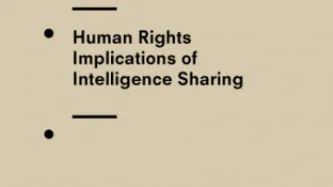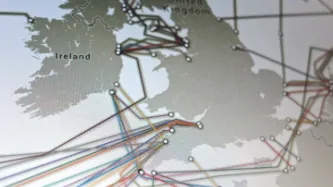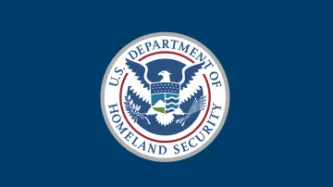Search
Content type: Advocacy
On 13 September 2017, Privacy International, in partnership with 30+ national human rights organisations, launched an international campaign for greater transparency around secretive intelligence sharing activities between governments. As part of this campaign, PI wrote to national intelligence oversight bodies in over 40 countries seeking information about the intelligence sharing activities of their governments. PI has created an interactive map which illustrates the countries…
Content type: Long Read
6 July 2017
Full briefing: UK-US Intelligence Sharing Arrangements
Urgent transparency is needed regarding the UK’s intelligence sharing arrangements with the United States, which allows UK and US agencies to share, by default, any raw intelligence and methods and techniques related to the acquisition of such intelligence. In a recent YouGov poll, three quarters of Britons said that they want the UK Government to tell the public what safeguards govern these arrangements. Privacy…
Content type: Advocacy
Privacy International welcomes this opportunity to engage in a dialogue over the implementation of the UN Security Council Resolution 2322 (2016), specifically as they related to intelligence sharing and mutual legal assistance mechanisms to access cross-border data.
Content type: Advocacy
Privacy International and the Italian Coalition for Civil Liberties' Joint Submission in Consideration of the Sixth Periodic Report of Italy Human Rights Committee 119th Session (6-29 March 2017).
The submission brings to the attention of the Committee the ongoing concern with Italian security agencies’ hacking capabilities and intelligence sharing arrangement, with Italian data retention procedures, and its export control regime as it relates to its robust…
Content type: News & Analysis
This piece was written by PI Research Officer Edin Omanovic and originally appeared here.
Whatever happens over the next few years, if there is to be a storm, then it is best to prepare. It is essential that western liberal democratic societies are resilient enough to uphold their fundamental values.
One of the UK’s biggest security assets is one of its biggest security threats. The UK’s spies have access to and are allowed to exercise some of the most sophisticated electronic…
Content type: Press release
Privacy International has today written to government ministers, members of the opposition, and oversight bodies reaffirming its call for the UK government to reveal secret intelligence sharing arrangements with the United States.
The original UKUSA agreement — drafted shortly after World War II — allows UK and US agencies to share, by default, any raw intelligence, collection equipment, decryption techniques, and translated documents.
Current arrangements also allow US…
Content type: Long Read
This week, Privacy International, together with nine other international human rights NGOs, filed submissions with the European Court of Human Rights. Our case challenges the UK government’s bulk interception of internet traffic transiting fiber optic cables landing in the UK and its access to information similarly intercepted in bulk by the US government, which were revealed by the Snowden disclosures. To accompany our filing, we have produced two infographics to illustrate the…
Content type: News & Analysis
Remember when the world didn't know what Prism was? Those were the days. While privacy advocates, civil libertarians, and technologists had suspected or posited the existence of an extensive surveillance regime operated by the U.S. government, few knew the details and the extent of the operation.
Undoubtedly, we know more now than we did a week ago about the National Security Agency's covert operations and how the agency routinely spies on nearly anyone in the world. The public, many…
Content type: News & Analysis
According to Snowden documents analysed by Privacy International, the Australian Signals Directorate had access to and used PRISM, a secret US National Security Agency program which provides access to user data held by Google, Facebook and Microsoft.
This is the third spy agency of the 'Five Eyes' alliance confirmed to have had secret access to Silicon Valley company data - an alliance whose rules and policies remain classified. Earlier this year, a British court ruled that GCHQ access to…
Content type: Press release
Human Rights Watch and three individuals have today lodged a legal challenge to establish whether their communications were part of those unlawfully shared between the US National Security Agency (NSA) and UK Government Communications Headquarters (GCHQ).
Despite billions of records being shared every day between the NSA and GCHQ, and that historical sharing having been declared unlawful [PDF], the Investigatory Powers Tribunal (IPT) has not yet confirmed to any claimant that their…
Content type: Long Read
Few revelations have been been as troubling for the right to privacy as uncovering the scope of the Five Eyes alliance. The intelligence club made up of Australia, Canada, New Zealand, the United Kingdom and the United States has integrated its collection efforts, staff, bases, and analysis programs. Yet the legal rulebook governing how the agencies ensure the most comprehensive joint surveillance effort in the history of mankind remains secret.
The little that is known suggests a…
Content type: News & Analysis
The central premise of international intelligence cooperation is that states are able to both access valuable partner information to protect their national security, and focus their own resources elsewhere in a mutually beneficial way. But is it really a quid-pro-quo partnership?
As the Intercept recently revealed, German policy-makers certainly have reason to doubt that this would be the case. What Germany has learned, like many others before them, is that dependence on the…
Content type: News & Analysis
Privacy International, Bytes for All and other human rights groups are celebrating a major victory against the Five Eyes today as the UK surveillance tribunal rules that GCHQ acted unlawfully in accessing millions of private communications collected by the NSA up until December 2014.
Today’s judgement represents a monumental leap forward in efforts to make intelligence agencies such as GCHQ and NSA accountable to the millions of individuals whose privacy they have violated.
The…
Content type: Press release
British intelligence services acted unlawfully in accessing millions of people’s personal communications collected by the NSA, the Investigatory Powers Tribunal ruled today. The decision marks the first time that the Tribunal, the only UK court empowered to oversee GHCQ, MI5 and MI6, has ever ruled against the intelligence and security services in its 15 year history.
The Tribunal declared that intelligence sharing between the United States and the…
Content type: News & Analysis
Intelligence sharing agreements can be open and transparent. In fact, the Five Eyes have already disclosed information sharing agreements that relate to key international law enforcement and national security measures.
They’re called mutual legal assistance treaties, or MLATs, and they’ve existed between the Five Eyes, excluding New Zealand, for decades. MLATs define the scope of cooperation between States in criminal investigations: States share sensitive information in criminal…
Content type: Long Read
Many people imagine intelligence sharing to be a practice whereby men in trench coats silently slide manilla envelopes containing anonymous tip-offs or intelligence reports marked TOP SECRET across tables in smoke-filled rooms.
While such practices certainly exist, they represent only a tiny slice of intelligence sharing activities, and are vastly overshadowed by the massive exchange of bulk unanlysed (raw) intelligence data that takes place between the UK and its Five Eyes allies.…
Content type: Press release
Britain's intelligence services do not need a warrant to receive unlimited bulk intelligence from the NSA and other foreign agencies, and can keep this data on a massive searchable database for up to two years, according to secret internal policies revealed today by human rights organisations.
Details of previously unknown internal policies, which GCHQ was forced to reveal during legal proceedings challenging their surveillance practices in the wake of the Snowden revelations, reveal…
Content type: News & Analysis
The following is an excerpt from an Op-Ed written in the New Zealand Herald by Privacy International's Legal Officer Anna Crowe:
Since the release of documents by Edward Snowden nearly a year ago, New Zealand has often been seen as a passive participant in the Five Eyes intelligence-sharing alliance, not unlike a good kid hanging out with the wrong crowd.
However, Snowden documents released last month and the news that New Zealand appears to be sharing intelligence…
Content type: Press release
Privacy International today has filed a complaint with the Australian Inspector-General of Intelligence Security, calling for an immediate investigation into deeply troubling reports that the Australian intelligence services offered to violate the privacy rights of millions of citizens by handing over bulk metadata to its Five Eye partners.
According to the leaked Five Eyes memo published in the Guardian on 2 December, the Australian Signals Directorate, during a meeting…
Content type: News & Analysis
The following is an excerpt from a Comment originally publihsed by The Guardian, written by Privacy International's Head of Research, Eric King:
As the global public reels from yet another Snowden revelation – this time, that the US and UK intelligence forces have hacked into and planted spyware on more than 50,000 computer networks worldwide – the hypocrisy of the US and British governments is brought into sharp relief. Less than four years ago Hillary Clinton, chastising China, declared that…
Content type: News & Analysis
We, and other privacy advocates, havecriticised the poor provisions of the so-called Safe Harbour agreement, which allows free transfers of personal information from European countries to companies in the United States that have signed up and promise to abide by its Principles. Now the European Commission, prompted by the recent mass surveillance scandals, has published an investigation into this agreement which provides overwhelming evidence that it is not fit for purpose. It…
Content type: Press release
The United Nations General Assembly should approve a new resolution and make clear that indiscriminate surveillance is never consistent with the right to privacy, five human rights organizations said in a November 21, 2013 letter to members of the United Nations General Assembly.
After heated negotiations, the draft resolution on digital privacy initiated by Brazil and Germany emerged on November 21 relatively undamaged, despite efforts by the …
Content type: News & Analysis
It was a strangely quiet summer. Beyond the Guardian's reporting of the Edward Snowden leaks and an appearance of William Hague before Parliament, there has been little uproar from the establishment about the extensive surveillance regime operated by the NSA and GCHQ.
No more greater has the silence been felt than from Whitehall, where MPs and government agencies remained tightlipped on the whole affair. This despite the fact that the revelations detailed the UK government's…
Content type: Long Read
Britain's spy agency, GCHQ, is secretly conducting mass surveillance by tapping fibre optic cables, giving it access to huge amounts of data on both innocent citizens and targeted suspects, according to a report in the Guardian.
Mass, indiscriminate surveillance of this kind goes against an individual's fundamental human right to privacy. The scope and scale of this program, which monitors the entire British public and much of the world, is neither necessary nor proportionate and thus,…
Content type: News & Analysis
The revelations of the US government's massive and indiscriminate surveillance program are absolutely frightening, putting before the public's eyes the breadth of a secret, dragnet spying regime which casts every US citizen as a suspect.
The unearthing of this top secret court order shows that even in a country that prides itself on checks and balances, and is governed by the rule of law, that government and law enforcement agencies operate within a murky legal framework…
Content type: Report
This is a memo prepared by Barry Steinhardt of Friends of Privacy USA for Members of the European Parliament regarding the proposed EU-US Agreement PNR.
The proposed agreement regarding Passenger Name Records (PNR) between the United States and the European Union is riddled with faulty assertions and assumptions about US law and the actual operations of the US government.
These faulty assertions and assumptions go to the heart of the agreement and undercut the claims of protections for…
Content type: News & Analysis
Nigel Waters has previously represented Privacy International at APEC Data Privacy Subgroup meetings, on one occasion with PI having official guest status, otherwise indirectly through membership of the Australian delegation. On this occasion, expenses were paid by USAid for participation in the technical assistance seminar, and this allowed attendance at the other meetings.
Cross border privacy rules
As a reminder, or for newcomers, the cross border privacy rules (CBPR) system is one…
Content type: News & Analysis
Privacy International and EPIC praised a vote today in the European Parliament today that rejected the transfer of finacial records to the United States under an interim agreement. A resolution to reject the deal passed 378-16, with 31 abstentions. Members of the parliament stated the proposed agreement lacked adequate privacy safeguards, and was a disproportionat response to US concerns about terrorism that also lacked reciprocity.
Simon Davies, Director General of Privacy International…
Content type: News & Analysis
Following an extensive campaign by Privacy International and our network of groups in the United Kingdom, the UK Government has decided to abandon its current plans for data sharing legislation.
The government has announced that it will immediately abandon clause 152 of the Coroners and Justice Bill, following on from an open letter that Privacy International sent to the Justice Secretary earlier this week.
As the Sunday Telegraph observed, the eloquence of the letter together with the…
Content type: News & Analysis
The Electronic Privacy Information Center has obtained documents showing that the U.S. Census Bureau provided the Department of Homeland Security statistical data on people who identified themselves on the 2000 census as being of Arab ancestry. All relevant information is on the EPIC website. The New York Times covered the story, and quoted the Census Bureau as saying that such 'cooperation' was standard practice. The deputy director of the Census Bureau is quoted as saying: "We do worry…























